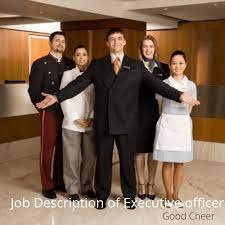Executive Housekeeper

In the realm of hospitality, the seamless functioning of a hotel or resort relies significantly on the efficiency of its housekeeping department. At the helm of this critical department stands the Executive Housekeeper, a pivotal figure responsible for ensuring cleanliness, orderliness, and overall guest satisfaction. With a keen eye for detail, organizational prowess, and adept leadership skills, the Executive Housekeeper plays a multifaceted role in maintaining the standards of cleanliness and comfort that guests expect. In this article, we delve into the responsibilities, qualifications, and challenges faced by individuals in this esteemed position.
Responsibilities of an Executive Housekeeper
The role of an Executive Housekeeper encompasses a wide array of duties, all aimed at maintaining impeccable cleanliness and presentation throughout the property. Here are some of the key responsibilities typically associated with this role:
- Staff Management: One of the primary responsibilities of an Executive Housekeeper is to oversee a team of housekeeping staff, including supervisors, room attendants, laundry personnel, and janitorial staff. This involves hiring, training, scheduling, and performance management to ensure that all team members adhere to established standards of cleanliness and guest service.
- Inventory Management: The Executive Housekeeper is tasked with managing inventory levels of cleaning supplies, linens, and guest amenities. This involves ordering supplies, monitoring usage, and implementing cost-effective measures to minimize waste and control expenses.
- Quality Control: Maintaining high standards of cleanliness and presentation is paramount in the hospitality industry. The Executive Housekeeper conducts regular inspections of guest rooms, public areas, and back-of-house spaces to ensure adherence to cleanliness protocols and identify areas for improvement.
- Budgeting and Cost Control: Responsible for overseeing the housekeeping budget, the Executive Housekeeper must effectively allocate resources to meet operational needs while minimizing costs. This involves analyzing expenditure, identifying areas for savings, and implementing strategies to optimize efficiency without compromising quality.
- Guest Satisfaction: Ultimately, the goal of the Executive Housekeeper is to ensure guest satisfaction by providing clean, comfortable accommodations. This entails addressing guest concerns or complaints promptly, implementing corrective actions, and maintaining open lines of communication with other departments to coordinate guest requests or special accommodations.
- Health and Safety Compliance: In addition to cleanliness, the Executive Housekeeper is responsible for ensuring compliance with health and safety regulations. This includes proper handling and disposal of hazardous materials, implementing procedures to prevent the spread of infectious diseases, and maintaining a safe working environment for staff.
Qualifications and Skills
To excel as an Executive Housekeeper, individuals must possess a combination of education, experience, and essential skills:
- Education: While a high school diploma may be sufficient for entry-level positions in housekeeping, many employers prefer candidates with a degree or certification in hospitality management, hotel administration, or a related field. Additional coursework in housekeeping operations, sanitation standards, and personnel management can provide valuable knowledge and skills.
- Experience: Previous experience in housekeeping or a related field is often required for executive-level positions. Candidates with a proven track record of leadership, staff management, and operational excellence are highly desirable. Experience working in upscale hotels or resorts can also be advantageous, as these establishments typically have higher cleanliness standards and guest expectations.
- Attention to Detail: The ability to notice even the smallest imperfections is essential for an Executive Housekeeper. From inspecting guest rooms for cleanliness to identifying maintenance issues or safety hazards, attention to detail is crucial for maintaining high standards and ensuring guest satisfaction.
- Organizational Skills: With numerous responsibilities to juggle, strong organizational skills are a must for Executive Housekeepers. From scheduling staff shifts to managing inventory and budgeting resources, the ability to prioritize tasks, delegate effectively, and stay organized amidst competing demands is essential.
- Communication Skills: Effective communication is vital for liaising with staff, guests, and other departments within the hotel. Whether providing clear instructions to housekeeping staff, addressing guest concerns, or collaborating with maintenance or front desk personnel, strong verbal and written communication skills are essential for success in this role.
- Leadership Abilities: As a manager responsible for overseeing a team of housekeeping staff, strong leadership skills are paramount. The ability to inspire, motivate, and mentor staff members, as well as resolve conflicts and foster a positive work environment, is crucial for achieving departmental goals and maintaining staff morale.

Challenges and Opportunities
While the role of an Executive Housekeeper offers numerous rewards, it also presents its fair share of challenges:
- Staffing Shortages: One of the most significant challenges faced by Executive Housekeepers is staffing shortages, particularly during peak seasons or in high-demand markets. Recruiting and retaining qualified housekeeping staff can be a constant struggle, requiring proactive measures such as competitive wages, employee incentives, and ongoing training and development programs.
- Maintaining Standards Amidst High Occupancy: In busy hotels or resorts with high occupancy rates, maintaining cleanliness standards can be particularly challenging. With limited time between guest check-out and check-in, Executive Housekeepers must coordinate efficiently to ensure that rooms are cleaned thoroughly and promptly without compromising quality.
- Adapting to Evolving Guest Expectations: As guest preferences and expectations continue to evolve, Executive Housekeepers must stay attuned to changing trends and adapt their approach accordingly. Whether implementing eco-friendly initiatives, enhancing guest amenities, or introducing new technologies to streamline operations, staying ahead of the curve is essential for maintaining a competitive edge in the hospitality industry.
- Balancing Budgetary Constraints: In an industry where profitability is closely tied to operational efficiency, Executive Housekeepers must continually find ways to optimize resources and control costs without sacrificing quality. This requires a keen understanding of budgetary constraints, as well as the ability to identify opportunities for savings and implement cost-effective solutions without compromising guest satisfaction.
